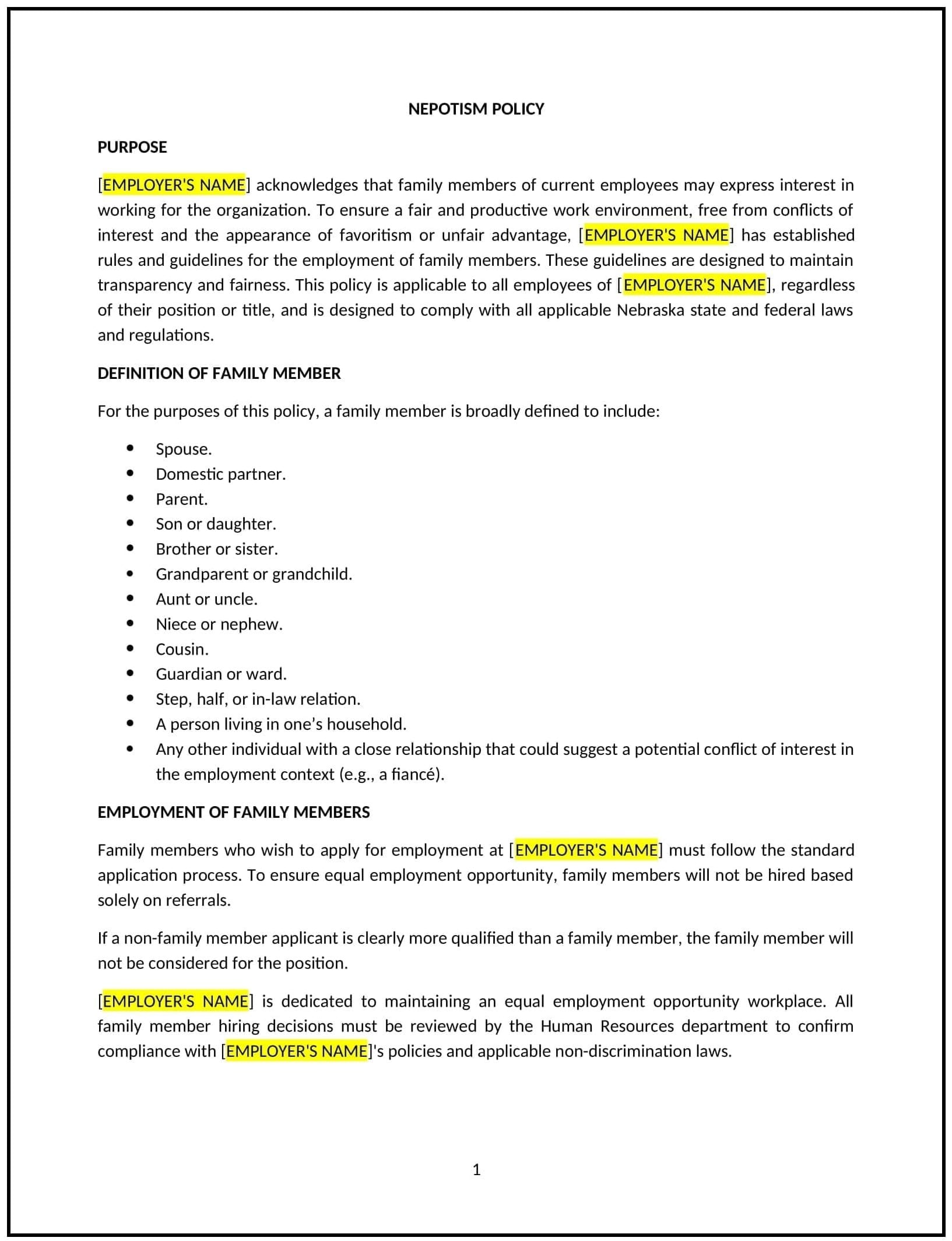Nepotism policy (Nebraska): Free template: Free template
Got contracts to review? While you're here for policies, let Cobrief make contract review effortless—start your free review now.

Customize this template for free
Nepotism policy (Nebraska)
A nepotism policy helps Nebraska businesses establish clear guidelines to prevent conflicts of interest and favoritism in the workplace. This policy is designed to promote fairness, transparency, and equal opportunities for all employees by addressing the hiring, supervision, and advancement of relatives or close personal connections. Tailored to Nebraska’s business environment, this policy ensures that decisions are based on merit and professionalism.
By implementing this policy, businesses in Nebraska can maintain a fair workplace culture, reduce potential conflicts, and build trust among employees.
How to use this nepotism policy (Nebraska)
- Define prohibited relationships: Clearly outline which relationships are considered conflicts of interest, such as hiring or supervising family members or close personal connections.
- Establish hiring guidelines: Specify that all hiring decisions should be based on qualifications, experience, and merit, without favoritism.
- Address supervision and reporting: Ensure that employees are not placed in positions where they directly supervise or are supervised by relatives or close personal connections.
- Set disclosure requirements: Require employees to disclose any potential conflicts of interest related to personal relationships in the workplace.
- Communicate the policy: Share the policy with employees during onboarding and through internal communications to ensure awareness and understanding.
- Train managers: Educate supervisors on how to identify and address potential nepotism issues fairly and consistently.
- Monitor and enforce the policy: Regularly review hiring, promotion, and supervision practices to ensure compliance with the policy.
- Review and update the policy: Periodically assess the policy’s effectiveness and make adjustments as needed to reflect changes in workplace dynamics or legal requirements.
Benefits of using this nepotism policy (Nebraska)
This policy offers several advantages for Nebraska businesses:
- Promotes fairness: Clear guidelines help ensure that hiring, promotion, and supervision decisions are based on merit and professionalism.
- Reduces conflicts of interest: Prohibiting nepotism minimizes the risk of favoritism and perceived bias in the workplace.
- Builds trust: A transparent policy demonstrates the business’s commitment to fairness and equal opportunities for all employees.
- Enhances workplace culture: A fair and merit-based environment fosters employee morale and engagement.
- Aligns with Nebraska values: The policy reflects the state’s emphasis on fairness, integrity, and community trust.
- Improves decision-making: Ensuring decisions are based on qualifications and experience leads to better outcomes for the business.
- Supports legal and ethical standards: A formal policy helps businesses align with best practices and reduce legal risks.
Tips for using this nepotism policy (Nebraska)
- Communicate the policy effectively: Share the policy with employees during onboarding and through regular reminders, such as emails or training sessions.
- Provide training: Educate managers and employees on the importance of avoiding nepotism and how to handle potential conflicts of interest.
- Encourage transparency: Foster a culture where employees feel comfortable disclosing personal relationships that may impact their work.
- Monitor hiring and promotion practices: Regularly review decisions to ensure they align with the policy and are based on merit.
- Address violations promptly: Take appropriate action if nepotism or favoritism is identified to maintain trust and fairness.
- Review the policy periodically: Update the policy as needed to reflect changes in workplace dynamics, employee needs, or legal requirements.
- Lead by example: Ensure senior leadership adheres to the policy and demonstrates a commitment to fairness and transparency.